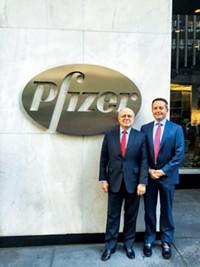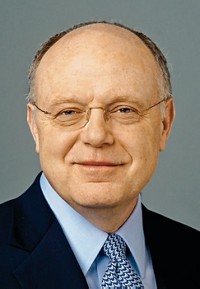Advertisement
Grab your lab coat. Let's get started
Welcome!
Welcome!
Create an account below to get 6 C&EN articles per month, receive newsletters and more - all free.
It seems this is your first time logging in online. Please enter the following information to continue.
As an ACS member you automatically get access to this site. All we need is few more details to create your reading experience.
Not you? Sign in with a different account.
Not you? Sign in with a different account.
ERROR 1
ERROR 1
ERROR 2
ERROR 2
ERROR 2
ERROR 2
ERROR 2
Password and Confirm password must match.
If you have an ACS member number, please enter it here so we can link this account to your membership. (optional)
ERROR 2
ACS values your privacy. By submitting your information, you are gaining access to C&EN and subscribing to our weekly newsletter. We use the information you provide to make your reading experience better, and we will never sell your data to third party members.
Business
Pfizer Increases Offer For AstraZeneca
Acquisitions: After rejection, U.S. company presses case to acquire U.K.-based drug rival
by Michael McCoy
May 2, 2014

Amping up a transatlantic drug industry merger drama that started at the beginning of the week, Pfizer raised its offer to acquire AstraZeneca. As it did before, the British firm rejected the bid.
The companies revealed on April 28 that Pfizer approached AstraZeneca about a combination back in November 2013. At a subsequent meeting in January, New York City-based Pfizer made a preliminary $100 billion offer of 70% stock and 30% cash, which AstraZeneca quickly turned down. At the time, Pfizer notified AstraZeneca that it was no longer actively considering the offer.
Late last month, Pfizer approached AstraZeneca again to try to restart discussions. AstraZeneca declined, prompting a new offer from Pfizer on May 2 of more than $105 billion. AstraZeneca responded that the new offer and its terms—including the large portion that would be in Pfizer shares—continue to undervalue the company.
Pfizer CEO Ian Read argues that a merger would strengthen the combined company’s “innovative core” as well as its product portfolio, particularly in the areas of oncology, inflammation, and cardiovascular health. Read points to recent drug development advances by both companies, the opportunity to build world-scale businesses, and an excellent strategic fit as reasons for his firm’s renewed interest.
In a letter to British Prime Minister David Cameron, Read tried to assure U.K. political leaders that an acquisition of AstraZeneca wouldn’t jeopardize the country’s pharmaceutical industry. “We recognize that our approach may create uncertainty for the UK government and scientific community given the strategic importance of life sciences to the government’s industrial strategy and the significance of the transaction,” Read wrote.
He pledged that Pfizer would employ a minimum of 20% of the combined company’s total R&D workforce in the U.K. and look to locate manufacturing operations of the combined firm there. He also said Pfizer would complete construction of AstraZeneca’s planned R&D and headquarters campus in Cambridge, England, and base key scientific leadership in the U.K.
In the letter, Read said Pfizer is committed to establishing the combined company’s corporate and tax residence in the U.K. rather than the U.S. Indeed, the tax implications of the proposed deal are garnering much of the financial community’s attention.
“It would have been very detrimental to the deal to bring AstraZeneca profits, which are taxed differently from the U.S., into the U.S. tax jurisdiction, which is why we opted for a domicile in the U.K.,” Read explained to the media in a conference call.
It’s not clear how the U.S. government would view such an “inversion,” or switching of potentially all of Pfizer’s tax liability to a lower U.K. rate. Noting that other U.S. companies have similarly moved offshore for tax reasons, ISI Group analyst Mark Schoenebaum wondered, in his firm’s own conference call on the news, whether Pfizer’s move would be “the inversion to end all inversions.”
Read responded to the issue by suggesting that “this transaction will make us a stronger company and give us greater ability to invest. Investment goes to places that have great science and really well-educated work forces, so I don’t believe it should be any concern to the U.S. government that we’re becoming a stronger company and more competitive on a global scale.”
Read also pointed to operational and financial synergies that would benefit a combined company. Schoenebaum suggested that Pfizer, which cut costs significantly when it acquired Wyeth in 2009, might trim at least 35% of expenses at AstraZeneca. British politicians are no doubt aware of Pfizer’s 2011 decision to close its research center in Sandwich, England, a move that cost more than 2,000 jobs.





Join the conversation
Contact the reporter
Submit a Letter to the Editor for publication
Engage with us on Twitter